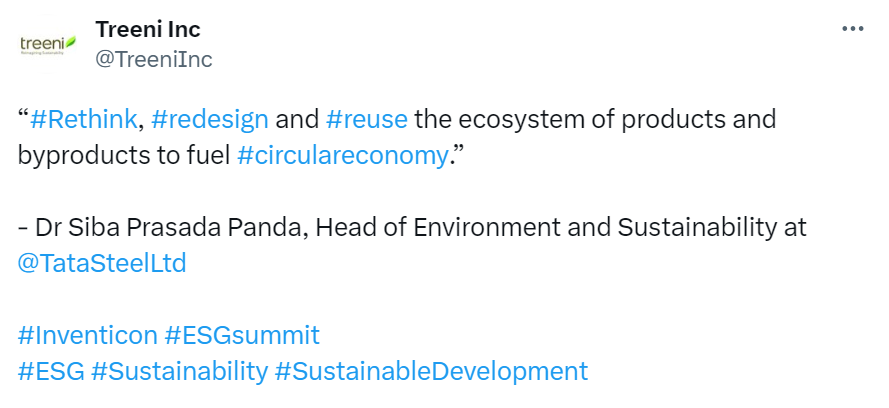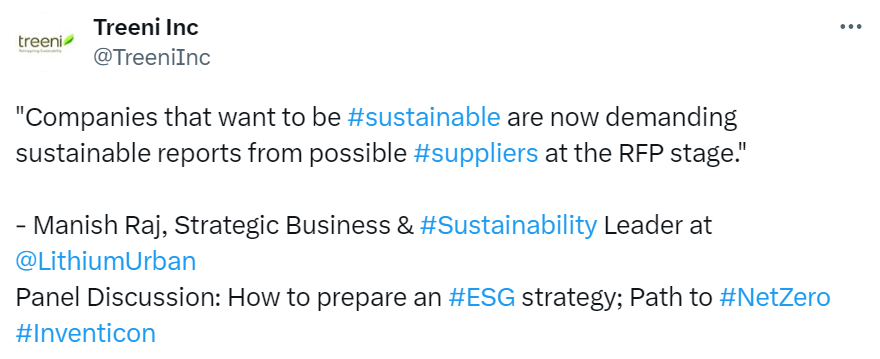Emerging Trends in ESG: What is the ESG world talking about?
17 July, 2023

In our last Blog on the highlights from the 3rd ESG & Sustainability Strategy India Summit, we discussed the broad theme of the summit - how ESG is imperative to Business and what the industry experts recommend that companies must do on their ESG journey.
In this blog, we are attempting to connect the dots between the various conversations, queries and interactions done in this industry event, and talk about the trends that we absorbed. The attendees were various ESG stakeholders - a mix of ESG consultants, large enterprises, investment experts, and CXOs, to name a few. Everyone is in a different stage of their ESG journey, but there was consensus on the below-emerging trends:
Circularity & New Age Waste Management
Customization of ESG Data Reporting
RFP with Disclosure Requirements
Technology & Automation
Interestingly the entire set of participants showed an awareness that when it comes to addressing these, enterprises and supply chains need to work as a unit towards achieving ESG goals.
-
Circularity & New Age Waste Management: New-age industries are producing new-age waste. While India’s effort towards circularity has been commendable, readiness for new-age wastes such as EV batteries, e-waste from laptops and mobile phones, and solar panels is critical. Dr Siba Prasada Panda, Head of Environment and Sustainability at Tata Steel Ltd. called upon everyone to “Rethink, redesign, and reuse the ecosystem of products and by-products to fuel a circular economy.”

Rajat Jariwal, Partner at Trilegal opined that “India’s disposal mechanism has been revolutionised in recent times in the light of the circular economy. From waste disposal to electronics, we have come a long way! The time to plant the seed is now!” Vicky Pagare, Asst. General Manager (HSES) at Highway Concessions One Pvt. Ltd., shared a case study on how plastic waste is being used to create and maintain highways as part of waste management and circular economy efforts.
-
Customisation of ESG Data Reporting: Over the two days, several noteworthy discussions shed light on key considerations in ESG reporting and its customization for different industries. The conversation emphasized the importance of avoiding analysis paralysis, with Vipul Arora, Senior Advisor ESG at Sattva Consulting, suggesting that businesses should focus on identifying their core strengths rather than getting overwhelmed by numerous parameters and data points. Dr Chakradhar Byreddy, Director – Renewables, Asia Pacific and EMEA at UL Solutions also touched upon the need to tackle Scope III as per each industry. "Scope III data must be industry-specific, as each industry has a different need." Dr Vidya Tikoo, Senior VP, of Sustainability at Aditya Birla Management Corporation, pointed to the significance of ESG consultants having a deep understanding of the client's business, as this is essential for creating robust and relevant data lakes that align with the client's goals and aspirations - “ESG consultants need to be able to understand the core client business, without which driving ESG goals for them will never be achieved appropriately.”
RFPs with Disclosure Requirements: During the 3rd ESG & Sustainability Strategy India Summit, an emerging trend in responsible business practice was brought to light. Companies are increasingly recognizing the importance of ESG and sustainability in their partnerships and procurement processes. In a notable shift, customers now call for comprehensive ESG and Sustainability reports to be included in proposals. This requirement demonstrates a clear commitment to working with suppliers who align with responsible business practices. By integrating ESG and Sustainability considerations into contract evaluations, companies are ensuring that sustainability is not just a buzzword but an integral part of their business relationships. Manish Raj, Strategic Business & Sustainability Leader at Lithium - an urban mobility company, confirmed that "Companies that want to be sustainable are now demanding sustainable reports from all their possible suppliers, including us, at the RFP stage."

-
Technology & Automation: "Measure Well to Manage Well " statement made by Dr Chakradhar Byreddy, Director – Renewables, Asia Pacific and EMEA at UL Solutions, highlighted the critical role of robust measurement frameworks and automation & technology, in driving effective ESG management. Companies acknowledged that to make meaningful progress in their sustainability journey, accurate measurement of their ESG performance is essential. By establishing comprehensive measurement systems and leveraging automation tools and SaaS platforms, organizations can streamline data collection, analysis, and reporting processes. This integration of technology not only saves time and resources but also enables companies to track their progress, identify areas for improvement, and demonstrate their commitment to stakeholders. "Automation has helped us tremendously in Governance and Compliance," remarked Tanmay Khare, Head of Administration & Human Resources at Pidilite Industries. The adage "What gets measured gets managed" holds even more weight when combined with automation, as it allows companies to effectively measure, manage, and optimize their ESG performance, leading to sustainable growth and positive societal impact. You can read more about How Technology helps ESG Data and Reporting here.
Conclusion
Thus, technology enabling and automating the ESG reporting process can help large enterprises achieve
goals both in their internal operations and contribution to circularity, as well as their specific business
goals including RFP disclosures. Conscious efforts towards these trends can get them first mover
advantage. Even if that’s not the case, clarity and hence readiness around ESG compliance will always
work positively towards the economic and sustainability ecosystem.
About Treeni
Treeni has established product market fit with the resustain™ SaaS platform - the sustainability data baseline in resustain™ enables enterprises to define strategy, and a roadmap to achieve goals & targets.
The two platforms we offer include:
● resustain™ Enterprise: ESG data management, dashboards & insights, performance
management, and reporting platform for large global enterprises
● resustain™ SMB: Addresses the unmet need of SMB (Small and medium-sized businesses)
Suppliers of large global enterprises, for ESG data & performance management, including
customer demands for CDP, Ecovadis reporting
resustain™ was built in India and Treeni's consulting and implementation teams can deploy to clients anywhere in the world. This unique ability and access to a large pool of domain and technology skills allow us to promise clients the lowest total costs of ownership (TCO).
__________________________________________________________________________________________________________________________________________________

